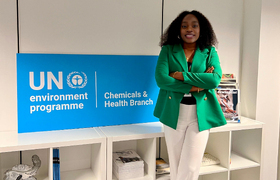‘This is an investment in dignity’
05 November 2025 | Story Kamva Somdyala. Photos Lerato Maduna. Read time 4 min.
The University of Cape Town (UCT) is tackling tuberculosis (TB) holistic treatment by creating a sense of community for patients at the Brooklyn Chest Hospital in Cape Town.
At the end of October, the UCT Lung Institute Centre for Lung Infection and Immunity launched the FreeOfTB library and recreational room along with several partners. FreeOfTB is a charity founded by Professor Keertan Dheda and is dedicated to supporting underprivileged TB patients and vulnerable communities through social, clinical, and educational outreach.
Two impactful projects were unveiled: a new paediatric library – a vibrant and nurturing space which will be filled with books, games, and educational resources to aid cognitive development and reduce isolation. As many of the children at the hospital live with long-term effects of TB meningitis and other neurological complications, the library aims to support their ongoing recovery and well-being.
The other is a recreational room for adults which has been transformed to provide a warm, welcoming, and engaging environment. This space includes comfortable seating, music, a television, and a variety of games such as table tennis and darts. It is designed to bring comfort and dignity to long-term adult patients, while also helping to alleviate boredom – a factor often linked to unhealthy behaviours during prolonged hospitalisation.
“This is about a show of community and care.”
“The spaces will be a superb source of education and constructive engagement for our patients who have to endure up to 24 months of treatment, and many of them have to stay in the hospital because they do not have appropriate facilities at home for a number of complex reasons,” said Professor Dheda.
“TB affects young people and is considered the foremost infectious disease killer in our nation. We are not going to get on top of TB mortality because one-third of the cases are attributable to drug-resistance TB.”
South Africa has made notable progress in controlling TB. Since 2015, the TB incidence rate has declined by 57%, and treatment coverage has increased to 79%. However, TB-related deaths have only declined by 16%, and over half (56%) of TB-affected households still face catastrophic costs in accessing care.
Another complication is the asymptomatic nature of it in some individuals. People who have TB then become undetected and unreported. “We have therefore had to change our tactic. We can no longer wait for patients to come to our clinics, so we have developed mobile clinic models to be used in communities,” said Dheda.
Dr Julian te Riele, the clinical manager at the Western Cape Metro TB Hospital Complex, said the two initiatives are about building human connections and healthy bonds. He said they represent the values of the public health system – dignity. “It is more than a facility; we are building hope.”
Health and Wellness MEC in the Western Cape, Mireille Wenger, echoed the sentiments: “This is about a show of community and care. It’s about progress and commitment and the values and support we have for patients, which is our shared purpose.” Wenger added that spaces for human interaction are necessary because of the ripple effect health diagnoses have on individuals, leading to loneliness and mental health struggles.
Stories, song, laughter
The dean of the Faculty of Health Sciences, Associate Professor Lionel Green-Thomspon, said: “Ultimately what we want for the patients who are here is that they become active members of their communities going forward. The library and recreational room are a translation of a vision into a tangible form of engagement.
“Science alone cannot restore the fullness of life; it requires light, colour, stories, song, laughter, conversation and connection and my sense is with these spaces, those are the gifts you are giving to patients and to the people who enter here. This is an investment in dignity,” he said.
 This work is licensed under a Creative Commons Attribution-NoDerivatives 4.0 International License.
This work is licensed under a Creative Commons Attribution-NoDerivatives 4.0 International License.
Please view the republishing articles page for more information.














